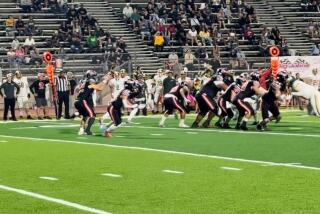‘84 Creditors Press for Money : Hart’s Growing Problem: Lingering Campaign Debt
- Share via
WASHINGTON — At first, Gary Hart thought the multimillion-dollar debt left over from his 1984 presidential campaign might be “a blessing in disguise.” He told an interviewer in 1985: “If I do run another national race, this has forced me to be on the road, instead of sitting in Washington having a good time.”
But this week the 1984 debt--far from being a blessing--turned into a potentially embarrassing problem for Hart’s newly launched quest for the 1988 Democratic presidential nomination.
As some old creditors pressed publicly for their money and others complained that they were pressured into settling claims for far less than face value, Hart suddenly faced a barrage of awkward questions. At best, they constitute a distraction from the Democratic front-runner’s efforts to raise money for 1988 and from his attempts to focus public attention on his strengths as a potential President.
At worst, the old debts could raise troublesome legal issues and even renew public concern over Hart’s personal attitudes and values.
Hart is “a guy who people still don’t know much about,” Democratic pollster Mark Mellman, as yet unaffiliated with any 1988 candidate, noted Friday, and the debt imbroglio could add to the “lingering mistrust” in voters’ minds left over from 1984.
For his part, Hart has generally spoken of the old debts as a serious obligation, but he has sometimes showed irritation over having to discuss them and has suggested that they should not be considered a significant issue for 1988.
He and his strategists have also indignantly pointed out that they have reduced the original flood of red ink from $4.7 million to $1.3 million, reducing the number of creditors from 750 on Jan. 1, 1985, to 60 at present.
And they note that in settling some of the debts for less than their full amount they have only followed the precedent of past campaigns.
Historically, it is true that many unsuccessful White House aspirants have carried forward large campaign debts for years, gradually reducing them as Hart has--with a combination of fund-raising and negotiations. The late Hubert H. Humphrey’s 1972 presidential campaign, for example, reportedly paid off close to $900,000 in debts in 1975 by settling with creditors for 4 cents on the dollar.
Uncomfortable Position
Hart, however, is in the uniquely uncomfortable position of being the first candidate to make a run for President while still in debt from a previous bid under the post-Watergate campaign reform laws. These statutes impose strict ceilings on campaign contributions and focus public attention on financial activities that used to be conducted mostly in private.
“The climate is different now,” said Michael Berman, a longtime Democratic fund-raising specialist who was treasurer of Walter F. Mondale’s 1984 campaign. “In the old days, creditors didn’t chase after you for money and the press didn’t pay attention to this stuff.”
Moreover, whatever the merits of the Hart campaign’s arguments, they may be overshadowed in the public mind by the image of federal marshals showing up at two Los Angeles fund-raisers this week to seize thousands of dollars raised for his 1988 candidacy to help satisfy a $162,000 judgment against his 1984 campaign.
Cite Election Laws
Hart’s advisers have contended all along that federal election laws would not allow them to use funds raised for the new campaign to pay off the 1984 obligations and this has been the central legal question underlying the controversy over Hart’s debt.
But on Friday, in the wake of mounting questions about the handling of the debt, Hart campaign manager William Dixon announced that the campaign would seek an advisory opinion from the Federal Election Commission on this critical issue.
Up to now, Dixon said, the Hart campaign had relied on “informal discussions with the FEC and informal discussions with our lawyers” for its understanding of the law. The decision to seek clarification, Dixon said, was because of Hart’s determination “to leave no stone unturned” in the effort to pay off the debts.
In decisions involving Democratic Sens. John Glenn of Ohio and Alan Cranston of California, the FEC has already held that money raised for Senate campaigns could be used to retire presidential campaign debts after their Senate campaigns were finished.
Unclear on Decision
Hart aides--and some independent campaign finance specialists--say, however, that it is not clear whether the FEC’s decision can be extended to cover transfers between one presidential campaign fund and another, particularly while the second White House bid is still going on.
The list of companies and individuals to whom Hart owes money reads like an index of services needed by a national campaign: printers, photocopying shops, rent-a-car and telephone companies, hotels and restaurants, graphic designers, sound studios and media consultants.
According to figures compiled by the Hart campaign, settlements with the 690 creditors paid so far averaged 52 cents on the dollar. Nevertheless, filings with the FEC, as well as statements by creditors, show that many debts were settled for far less.
U.S. Sprint, for example, the Kansas City-based long distance telephone company, accepted $38,300.82 to pay off $342,749.33 that Hart owed them. Merchant Motors, a large New Hampshire car rental service, took 20 cents on the dollar for the roughly $12,000 it was owed.
‘Took What We Could’
Said Leona Maupin, owner of Unionist Printing Co. in Omaha: “They sent a letter and said we either settled for that or we wouldn’t get anything, so we just took what we could get.” The company printed 500 11-by-14-inch placards for Hart in 1984 and received $160 for its $290.80 bill.
Similarly, Kwik Copy Printing in Decatur, Ga., took 30 cents on the dollar for the roughly $2,700 that Hart owed the firm. “I didn’t want to do it, but my wife twisted my arm, said I should take what I could get,” owner Charles Mizell said in an interview Friday.
Even such settlements are not necessarily closed matters for the Hart campaign. Federal election law requires that all settlements be reviewed by the FEC, which checks to make sure that companies are not in effect making campaign contributions by agreeing not to make a “commercially reasonable effort” to collect their debts.
Any such contribution by a corporation would be illegal and contributions by individuals are limited to $1,000.
Additional Data Sought
The FEC approved some of Hart’s debt settlements in the past, but none of them have been approved since June 9, 1986. In the intervening 10 months, the commission has asked Hart’s staff for additional information and has continued to investigate whether any improprieties may have been committed.
Apart from spotlighting Hart’s debt, the reform laws created an obstacle toward their payment by prohibiting Hart supporters who had already made the maximum contribution of $1,000 to his candidacy in 1984 from giving any more to help retire the debt.
And Hart made things harder for himself, at least financially, by refusing to take contributions from political action committees, which under the law could have given up to $5,000 to help him defray the debt.
Hart had made a great issue out of not accepting PAC funds in his 1984 campaign, contending that such contributions would obligate him to the special interest groups that the PACs represent.
Charges by Rivals
High-minded as that position might seem, some of Hart’s rivals for the Democratic nomination quickly took advantage of his predicament to contend that Hart undercut his principles by negotiating settlements with some corporate creditors.
“While he claims that he’s not taking money from the PACs because they are special interests, he’s been making settlements with creditors that could be construed as corporate contributions, which are illegal,” argued Duane Garrett, campaign chairman for another Democratic presidential contender, former Arizona Gov. Bruce Babbitt.
Hart’s man Dixon rejected the analogy. “None of our creditors had legislation before Congress, like the interest groups the PACs represent have,” Dixon said.
‘More Hart Supporters’
Dixon and other Hart advisers sought to minimize the impact of the debt episode on his candidacy. “There were more Hart supporters at the end of the week than the beginning,” said Hart’s national political director, Paul Tully.
One of his rivals, at least, disagreed. “I think it certainly has done public damage to his candidacy,” Garrett said.
Looking on the bright side, pollster Mellman said: “It’s much better for Hart that this happened now, when many people are not paying much attention to presidential campaigns, than next February.”
More to Read
Get the L.A. Times Politics newsletter
Deeply reported insights into legislation, politics and policy from Sacramento, Washington and beyond. In your inbox twice per week.
You may occasionally receive promotional content from the Los Angeles Times.











